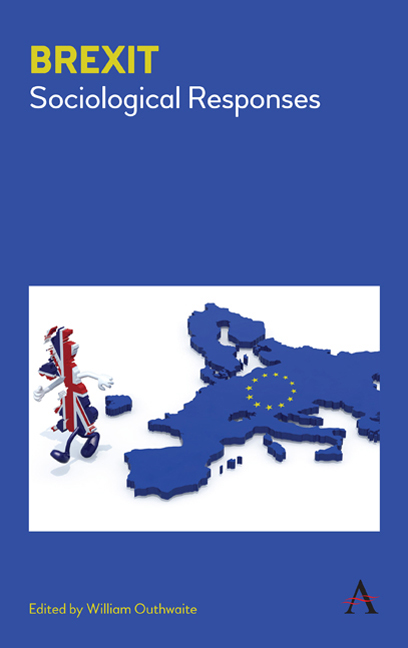Book contents
- Frontmatter
- Contents
- Preface
- Section 1 HOW DID IT HAPPEN?
- Chapter One The Increasing Inevitability of That Referendum
- Chapter Two Vox Populi: Nationalism, Globalization and the Balance of Power in the Making of Brexit
- Chapter Three Exit from the Perspective of Entry
- Chapter Four Brexit, Sovereignty and the End of an Ever Closer Union
- Section 2 THE POLITICS OF BREXIT
- Section 3 PROSPECTS FOR/ AFTER BREXIT
- Notes on Contributors
- Index
Chapter Two - Vox Populi: Nationalism, Globalization and the Balance of Power in the Making of Brexit
from Section 1 - HOW DID IT HAPPEN?
Published online by Cambridge University Press: 10 January 2018
- Frontmatter
- Contents
- Preface
- Section 1 HOW DID IT HAPPEN?
- Chapter One The Increasing Inevitability of That Referendum
- Chapter Two Vox Populi: Nationalism, Globalization and the Balance of Power in the Making of Brexit
- Chapter Three Exit from the Perspective of Entry
- Chapter Four Brexit, Sovereignty and the End of an Ever Closer Union
- Section 2 THE POLITICS OF BREXIT
- Section 3 PROSPECTS FOR/ AFTER BREXIT
- Notes on Contributors
- Index
Summary
Today the term ‘vox pop’ most commonly refers to those snippets of opinion from people ‘on the street’ heard and seen on radio and television. We had many of these from those who would turn out to be part of the small majority for leave in the run- up to the Brexit referendum on 23 June 2016. Two main themes often repeated in these snippets were that people wanted to limit levels of immigration seen to be out of control, and that they wanted take back control over the laws by which they were governed. In both cases, behind fears of and resentments towards immigrants and European Union (EU) bureaucracy, lies a fundamental feeling of lack of control, of powerlessness. We need to understand this. The phrase vox populi, vox Dei (the voice of the people is the voice of God), or simply vox plebis (voice of the people) has a long history in English politics, serving the critiques of centralized power offered by medieval archbishops, Levellers and Whigs in turn (Maloy 2013: 124– 126). David Hume famously claimed that ‘it is […] on opinion only that government is founded’ (1985: 32– 33), by which he meant that centralized power can never ultimately force submission of a large mass of people. It relies either on active support or at least willing acquiescence. Either way, the point is that people are ruled through opinion, and opinions matter. The Brexit referendum gave a large portion of the British population that felt its opinions were disregarded, a single, highly constrained opportunity to express their views, and their resentment.
This chapter attempts to place the call for Brexit and what we know about those who voted for and against it in the context of concepts of nationalism, globalization and, most crucially, the evolving balance of power in society. The first two are necessary for framing this event, but the third gives us more analytic purchase on the general course of events. After considering Brexit from these three angles, I return to questions of public opinion and ideology, and their role in misrepresenting that general course of events and facilitating Brexit.
- Type
- Chapter
- Information
- BrexitSociological Responses, pp. 19 - 30Publisher: Anthem PressPrint publication year: 2017

